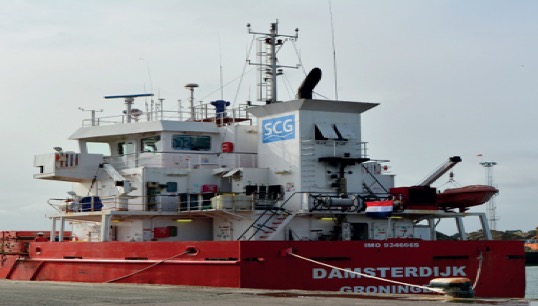
Officially-approved safe manning levels for ships must properly reflect the reality of operations and ensure that regulated rest hours for crew members are guaranteed, the Dutch Safety Board has warned.
In a report on a fatal accident onboard the 2,984gt general cargo ship Damsterdijk in the UK port of Ipswich in October 2019, the board highlights the problem of supervising safety-critical tasks with minimal crew numbers.
A cook/AB on the ship died after being struck by a mooring line which became entangled in the propeller and broke as the ship was being moved backwards to make space for another vessel.
Investigations revealed that Damsterdijk’s owners had been 'mistakenly' issued with a minimum safe manning certificate permitting operations with just six seafarers. At the time of the accident there were eight onboard, although the manning plan contained a task description for a crew consisting of nine seafarers, in which an officer would have been available to supervise the mooring and unmooring procedures.
The AB who had been given the responsibility for the supervision of the aft deck work was placed in an impossible position, the safety board concluded, as he was actively involved in handling the mooring lines.
The report notes that there was consequently ‘no overview and supervision of the various actions on the aft deck, so that no warning could be issued by the AB in charge about the hazardous situation that had arisen’.
A cadet had been deployed to handle a payed-out mooring line even though he 'was not competent to carry out the tasks during the manoeuvre, which could not be expected at this stage of his training', the report adds.
Communication problems on the aft deck were compounded by a decision to only provide walkie-talkies to the cadet and the crew members in charge, the report states, and this meant that orders being passed on had to be shouted out against the background noise.
Investigators were unable to determine what action had been taken in response to a risk analysis carried out by the chief officer only seven months before the accident which warned of the dangers posed by insufficient coordination and communication, fatigue, overloading of the mooring lines and winches, and shortcomings in the mooring plan.
They also found that the AB in charge on the aft deck had not had sufficient rest – having worked at least 17 hours in the previous 24 – and that this could have adversely affected his ability to properly monitor operations.
The report further points out that there were no warning markings of snapback zones onboard Damsterdijk and that the cook/AB had entered a snapback zone when he tried to prevent the starboard stern line from going overboard.
The report recommends that the owners ensure that the ship 'is manned and equipped in such a way that all work onboard can be carried out safely' and that crew members are 'sufficiently safety-aware and safety-competent to prevent accidents onboard'.
It calls for the Dutch ministry of infrastructure and water management to ensure that proposals for minimum safe manning are always checked for their feasibility in relation to the work to be carried out, the type of ship, and safety and emergency procedures.
Tags
More articles
US National Transportation Safety Board (NTSB) calls for measures to reduce confined channel risk
The US National Transportation Safety Board (NTSB) has called for new measures to reduce the risks of operating large ships in confined channels – highlighted by the Ever Given containership's grounding in the Suez Canal.
Target health and safety measures by rank, BMJ advises
The shipping industry needs to adopt targeted health and safety strategies to combat rank-specific accidents and medical conditions, a new report has warned.
